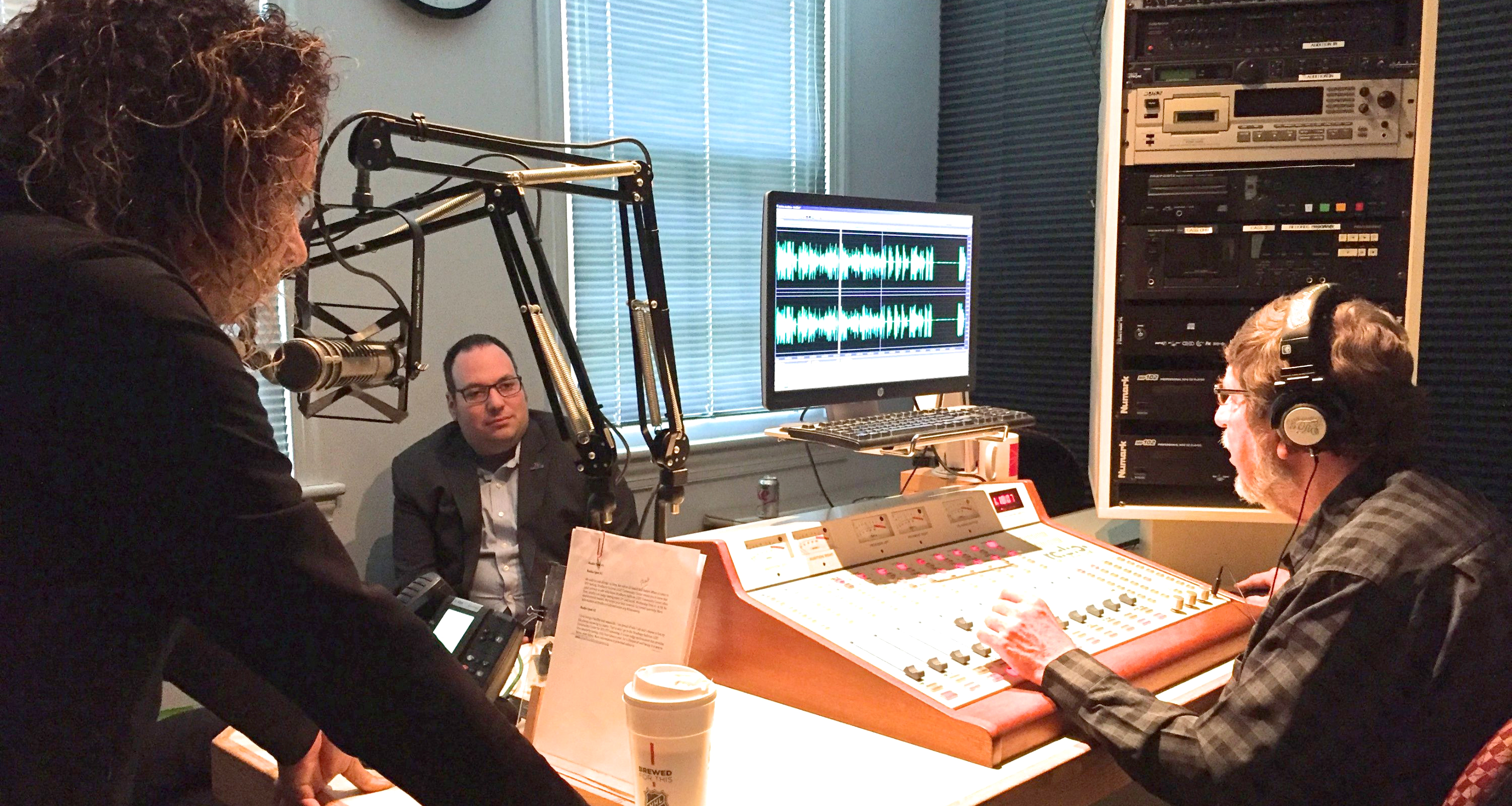Media Advocacy Students Produce Radio Spots to Encourage Local Young Adults to Get Tested
A service learning partnership with Bradbury-Sullivan LGBT Community Center resulted in ads promoting quarterly HIV/STI testing for college students.Thursday, October 19, 2017 02:26 PM
 Bradbury-Sullivan LGBT Community Center’s administrative manager Ariel Torres and founder & executive director Adrian Shanker '09 with WMUH's former general manager Joe Swanson (left to right) as the group produces an advertisement created by Media Advocacy students
Bradbury-Sullivan LGBT Community Center’s administrative manager Ariel Torres and founder & executive director Adrian Shanker '09 with WMUH's former general manager Joe Swanson (left to right) as the group produces an advertisement created by Media Advocacy studentsWhen planning for her spring 2017 service learning Media Advocacy class, Susan Kahlenberg, associate professor of media & communication, sought a community partner with a passion for social justice.
Meanwhile, in downtown Allentown, Adrian Shanker ’09, founder & executive director of Bradbury-Sullivan LGBT Community Center, wanted help promoting quarterly HIV/STI testing.
Beth Halpern, Muhlenberg's director of community engagement, recommended Kahlenberg reach out to Shanker. The two teamed up, and Kahlenberg enlisted her Media Advocacy students to help the Center.
“Adrian and I were excited by the partnership as we both are committed to improving human and social conditions in our professional capacities,” said Kahlenberg, whose own research is based in social justice.
The goal of the collaboration was to reach historically marginalized and underrepresented populations—namely LGBT college students—to inform them that the Center offers quarterly HIV/STI testing, a critical health service.
“In the Lehigh Valley, HIV represents a specific healthcare disparity among the LGBT community,” said Shanker, a political science and religion studies major who holds a graduate certificate in LGBT Health policy & practice from The Columbian College of Arts & Sciences at The George Washington University. “We found that one quarter of LGBT individuals in the Lehigh Valley hadn’t been tested at all, and 60 percent hadn’t been tested in the last year. Infrequent testing does not allow individuals to accurately know their status.”
The class culminated in a research project, and while students discussed a range of advocacy work throughout the semester, Shanker and Kahlenberg decided to focus on the medium of radio advertisements for the final project.
Because the target audience was college students, and because the group had minimal resources to execute their campaign, the class looked to another community partner for cooperation—Muhlenberg’s radio station, WMUH.
“Our department has a longstanding partnership with WMUH, and we expected the station would be receptive to a barter arrangement,” said Kahlenberg. “This arrangement gave students real world experience in developing and negotiating a pitch.”
Student work throughout the semester, including the cumulative project, was grounded in theoretical and research principles in media advocacy, health communication and public health. Students combined course readings with independent research provided by both Shanker and Kahlenberg.
Shanker brought the community-based experience to the table, providing Kahlenberg’s students with a number of advocacy and policy-related readings. Additionally, Shanker provided the data from the Lehigh Valley LGBT health needs assessment administered by the Center, which was used to establish the focus on quarterly HIV/STI testing.
“As service learning partners we worked well as co-facilitators based on our areas of expertise,” said Kahlenberg. “Students understood they would be using an evidence-based approach to connect what they learned in the classroom to the wider Lehigh Valley community.”
“Service learning works best when it’s a true collaboration from beginning. We [at Bradbury-Sullivan LGBT Community Center] are working under certain framework and theories that guide our work,” added Shanker. “It was incredibly important that the students understood the culture and mission of our organization. They had to understand the feelings associated with testing so that they could create a space where the individuals we wanted to reach did not feel judged, felt honored in their identity and were comfortable enough to come in and get tested.”
For their project, the Media Advocacy class was split into four small groups: one focused on audience segmentation research, which served as a resource to the other groups; one exploring all radio-related specifics, including FCC guidelines; and two groups who competed to produce the radio spot that would ultimately go on air.
While the audience segmentation group helped guide the project collectively, the radio group pitched the idea to WMUH. The two competing ad construction groups—designed to replicate real-world competition for a client’s business—each produced their own radio spot. Shanker, representing the client, chose the “winning” ad.
The selected spot was produced by then general manager of WMUH Joe Swanson and voiced by Bradbury-Sullivan LGBT Community Center’s administrative manager Ariel Torres. This fall, the ad ran for six weeks on WMUH in a barter trade for WMUH sponsorship at the Center. All told, the students negotiated for $1,900 worth of production and airtime.
“We believe in service learning,” said Shanker. “Projects like this help create the next generation of health advocates. It was a great opportunity for Muhlenberg students to learn and get involved.”
